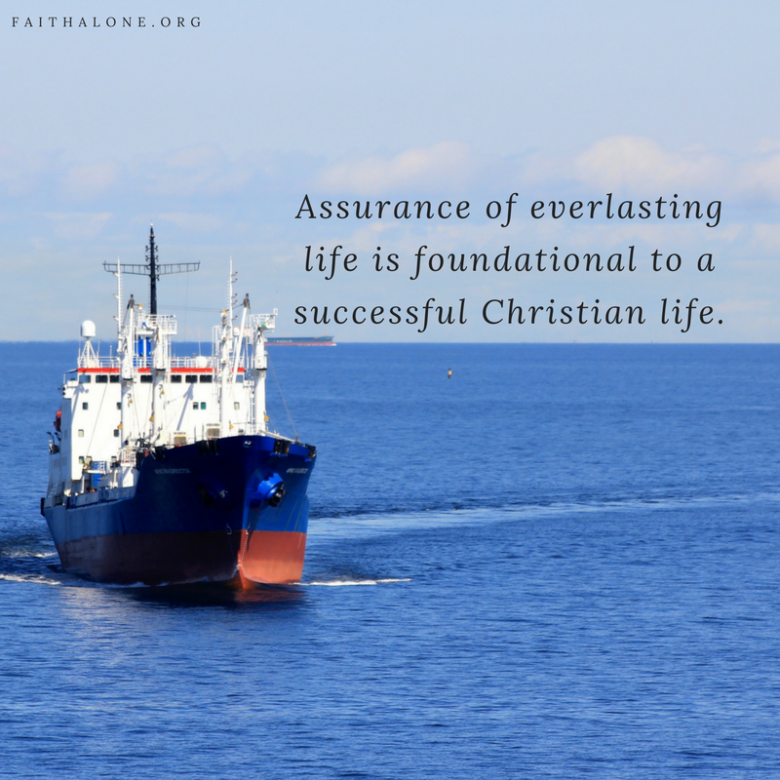A friend sent me a 5-minute video by Dr. Jeremy Pierre, Associate Professor of Biblical Counseling at Southern Baptist Theological Seminary. On September 17, 2017 in a show called Honest Answers, Pierre discussed the issue of assurance. You can watch the video by clicking here.
Pierre only discusses two options: backslidden Christian or unbeliever. I suppose, though he never addresses this issue, that he believes that there are some people who call themselves Christians who know that they are neither backslidden Christians nor unbelievers. He probably thinks that at least some people are sure that they are born again. Or does he?
Actually as the video progresses it appears that Pierre believes that no one could be sure of his eternal destiny.
The basis of assurance, according to Pierre, is a pattern of repentance that manifests itself in proper actions. In other words, if a person who struggles with some sin or sins recognizes victory in his life, then he is probably a Christian.
Pierre says, “I think the simplest answer is repentance over time. It’s a return to God that’s displayed in a pattern of seeking. So notice, I’m attaching this concept of time as a necessary aspect of a growing confidence or awareness of my status” (0:25-0:57).
What does he tell men he counsels who are struggling with sin and who wonder if they are born again? He said, “I tell them—you know, they are looking to me for assurance—and I just tell them, ‘I don’t know.’ And then I go another step for them. ‘And I don’t think that you can know that at this point.’ Not because it is some gnostic mystical idea that you just have to find the right way of thinking in order to find the settledness of mind. But the way the Bible describes Godly sorrow, it requires ongoing patterns, ongoing activities of consistent repentance. So I just reassure them, ‘Look, let’s not spin our wheels trying to really ask that question right now. Instead, let’s spend our efforts seeking the gospel of Jesus Christ and His understanding of what your sin is and His solution to you coming out of that sin. Let’s spend our efforts pursuing Him, and that will show itself in a pattern over time that will then result in an increasing assurance or awareness of whether I’m saved or not. Or, if you really don’t belong to the Lord, then you are going to get frustrated with the process. You are going to cling to your sin because you actually love it and you are trying to appear like you don’t love it, but your love will come through eventually. And eventually you will just want to dust your hands of this thing and be done with this and live openly and sort of genuinely in a sense of I’m not going to pose any more.’ And so time is a key element of being able to gauge that repentance.” (2:17-4:08).
Wow. I find such an approach to be demoralizing to the person who is sensitive and who is not looking to Christ, but himself, for assurance.
And did you notice that he rejects the view that assurance is found in looking to what Jesus has promised? Assurance is not found in finding “the right way of thinking.” Actually, that is what Scripture teaches. Assurance is found in believing what God has said (John 3:14-18; 5:24, 39-40; 1 John 5:9-13). Believing what God has said is the right way of thinking.
Did you notice as well that Pierre assumes that if a person struggles with sin and does not find victory in a reasonable amount of time (by the way, how much time is too much?), then he loves his sin. Really? Many alcoholics and other drug addicts I’ve known have hated their sin for decades before they finally hit rock bottom and found sobriety. I do not believe that they loved losing their jobs and their families and becoming homeless and resorting to crime.
No one is free from struggles with sin. No one’s actions are perfect. Thus under Pierre’s method, certainty of one’s eternal destiny is impossible.
Of course, his method is quite popular today. It is essentially a form of the Puritan practical syllogism. True believers live holy lives. I am living a holy life. Therefore, I am a true believer. The problem is, how does one accurately gauge that he is living a holy life? Let’s not talk about people who struggle with immorality or drunkenness. How about people who struggle with anger, jealousy, a critical spirit, envy, strife, anxiety, depression, and so on? Surely Pierre would have to tell them to spend their efforts seeking to find victory “that will result in an increasing assurance…”
I highly recommend watching this video. Then compare it to some of the videos on assurance that come from a Free Grace perspective. You might want to listen to Zane Hodges here (1 hour), me here (1 minute), Bob Bryant here (50 minutes) or a panel with Jody Dillow, Charlie Bing, Zane Hodges, and me here (1 hour).
My hope for Dr. Pierre is that he sees the truth. Assurance of everlasting life is such a motivating thing. Trying to find victory over sin in order to gain assurance is totally backwards. Assurance of everlasting life is foundational to a successful Christian life.


